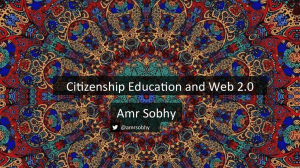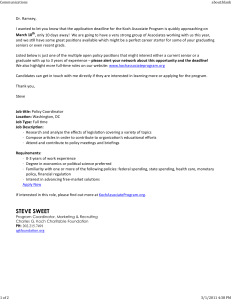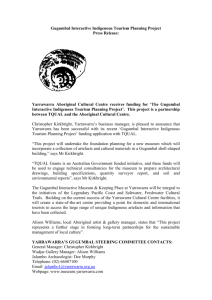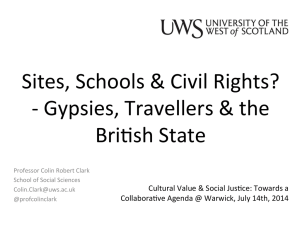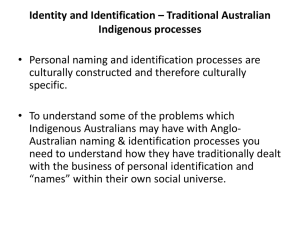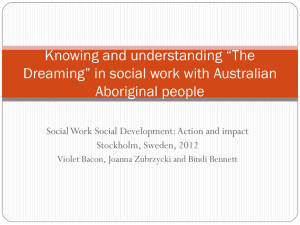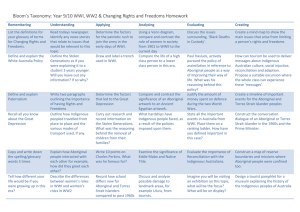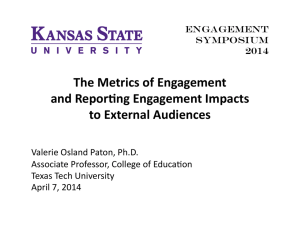Document 11997739
advertisement
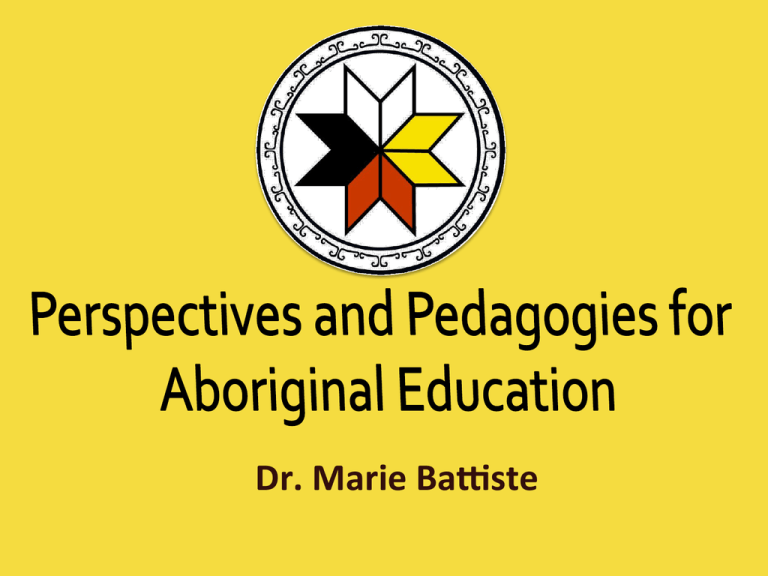
Dr. Marie Ba*ste Pedagogy and Protocols of Place Treaty Six Territories My Work • Seeks to raise consciousness and resist Eurocentric privileges, frameworks and norms • Seeks decolonizing educa?on that advances cogni?ve and cultural diversity • Generates pedagogy of holis?c knowledge and learning • Recognizes dis?nc?ve Aboriginal learning processes and outcomes from place • Reclaims Indigenous knowledge, voice and visions to restructure learning My Courses • A European ‘centre’ characterized by superiority, progress, hegemony, and monopoly over all other knowledge systems. • Characterized as a singularity in no?ons of universal and diffused to the periphery. • Dominant theory legi?mized in science, educa?onal and public ins?tu?ons, publica?ons/print, etc. Cogni?ve Blocks created by Public Educa?on • Students rooted in Eurocentrism • ANtudes of superiority and difference as deficiency in discourse • White dominance and advantage normalized as status quo • Insufficient exposure to FNMI (one 3 cu Na?ve Studies Course required in educa?on) • LiXle knowledge or cri?cal perspec?ves on their loca?on Cogni?ve Imperialism • Built on imperialist knowledge and damaging assump?ons • Reflected in privileging of colonial languages, discourses, knowledge, prac?ces, Euro-­‐Anglo cultural origins, protocols • Creates ‘othering’ and ‘different’ • Inflicts soul wound on Indigenous peoples and on the land Decolonizing Awareness Ø Every researcher/student has been a vic?m and beneficiary of the same educa?onal system. Ø Few persons are privileged with the knowledge of how to achieve a decolonized educa?on. Ø We all must become cri?cal learners and healers within a wounded space. Diverse characteris?cs of Aboriginal Peoples in Saskatchewan • First Na?ons, Inuit and Mé?s • 6 languages in Saskatchewan • Over 75 FN reserves (popula?on: <100 to >5000) • Diverse langscapes/regions • Diverse Experiences within Place: Rural/ urban/North, South/provincial public, FN Schs Place-based cultures • Languages • Worldviews • Spiritual/Flux/ Animistic • Relational • IK • Resilience • “We have the emoBonal drop-­‐out from the insBtuBons before the physical drop-­‐out; we need to dismantle fears if we are to engage spirit; fulfill their needs, not ours, but our learners’ needs.” Ningwakwe George “I have worked in literacy for fi5een years, and I know that almost 99.9 percent of learners that come into literacy programs have dealt with major trauma in their lives, and there are a lot of blocks.” Nancy Cooper Safety for talking about FNMI and social jus?ce SeNng Ground Rules: – Listen ac?vely—respect others when they are talking – Speak from your own experience instead of generalizing: “I” instead of “they”, “we,” and “you” – Respeciully challenge one another by asking ques?ons, but refrain from personal aXacks—focus on ideas – Par?cipate to the fullest of your ability—community growth depends on the inclusion of every individual voice. – Instead of invalida?ng somebody else’s story with your own spin on her or his experience, share your own story and experience. – The goal is not to agree—it is to gain a deeper understanding. – Be conscious of body language and nonverbal responses—they can be as disrespeciul as words (EdChange Awareness Ac?vi?es) Reading Reviews • Students need to find their loca?ons, voice and agency in their readings, wri?ngs, and discussion • Each student is responsible for up to 4 readings, give a brief summary, and iden?fy 4-­‐5 quotes from which they are to comment from their experiences, linking ideas, other readings, teachings, ‘ah-­‐hah’ moments, or moments of discord, etc. • Ques?ons given before reading help to iden?fy key concepts. Other Strategies • Rela?onal work is paramount to success • Invite Elders and Aboriginal scholars to share their stories, research, experiences, guidance • Learn protocols of place and diverse ways to engage local communi?es, organiza?ons, Elders • Students assignments connected to place: processes of deconstruc?on and rebuilding • Talking circles, community engagements, group work • Share conceptual and vocabulary discourses of academia in books, glossaries, reference works Decolonization: Two-Prong Project • Deconstruction: Exposing political, moral and theoretical inadequacies of colonialism and culturalism in education. • Reconstruction: Transforming education and unleashing the potential of students in global diverse knowledge societies Deconstruction § Develop awareness and critique of Eurocentric, colonial bias and its racialized negative discourses and values and its effects on everyone § Examine Constitution (Section 35 (1), laws (Indian Act), policies, history and differential treatment and resources of Aboriginal peoples § Address intergenerational trauma, cognitive assimilation, loss of languages, IK, past and present negativities and traumas associated with the past, including lateral violence, internalized racism Reconstruction • Help students to see value and benefits from Indigenous knowledges in their lives and education: science, humanities, and visual arts, etc. • Aim for theory and practice to heal present and past traumas • Provide ways to reconstruct, reclaim, restore, renew Indigenous presence, identities, knowledges, and self-determination. Inclusive Pedagogies • Make explicit socialization in a racist culture and interconnectedness of oppressions related to race, class, gender, abilities, sexualities • Accept heterogeneity and diversity as the norm. • Rethink what distinctiveness and difference means when considering FNMI and how they are represented. • Re-conceptualize ‘mainstream’ as changing and fluid place with many voices, experiences, and knowledge, not as status quo. Aboriginal Rights and the Courts Where there is an Aboriginal right, there is a corresponding right to teach that right. (R. v. Côté, [1996] 3 S.C.R. 139) Many Sources of Inspira?on Canada’s Cons?tu?on: Aboriginal treaty rights Canada’s apology for Indian Residen?al Schools SSHRC Research in Aboriginal Programs Declara?on of the Rights of Indigenous Peoples Conven?on on the Elimina?on of Racism and Discrimina?on, etc. • Ac?vism and Voices of the Indigenous Renaissance • • • • • Authors on Indigenous Worldviews • • • • • • • Gregory Cajete Richard Atleo Oscar Kawagley Kathy Absolon Karla Jessen Williamson BeXy Bas?en Leroy LiXlebear • • • • • • • Jo-­‐ann Archibald J. Y. Henderson Herman Michell Willie Ermine Mar?n Nakata Tyson Yankaporta Shawn Wilson
